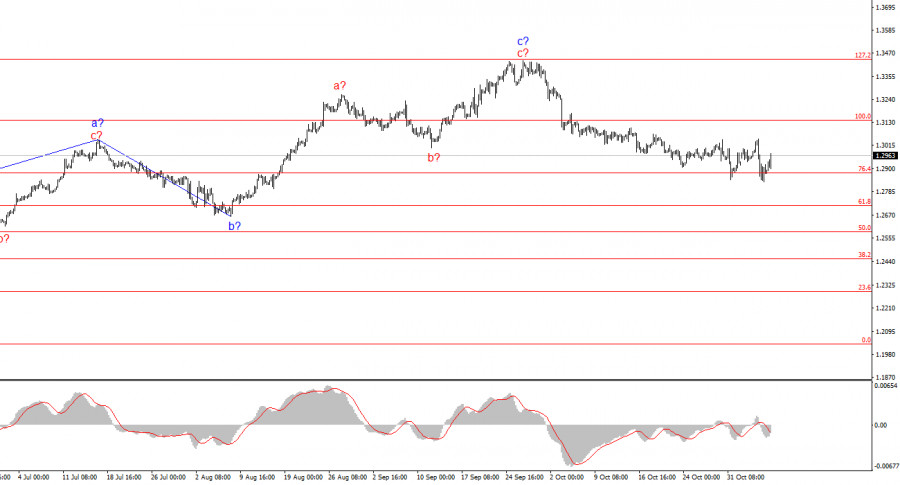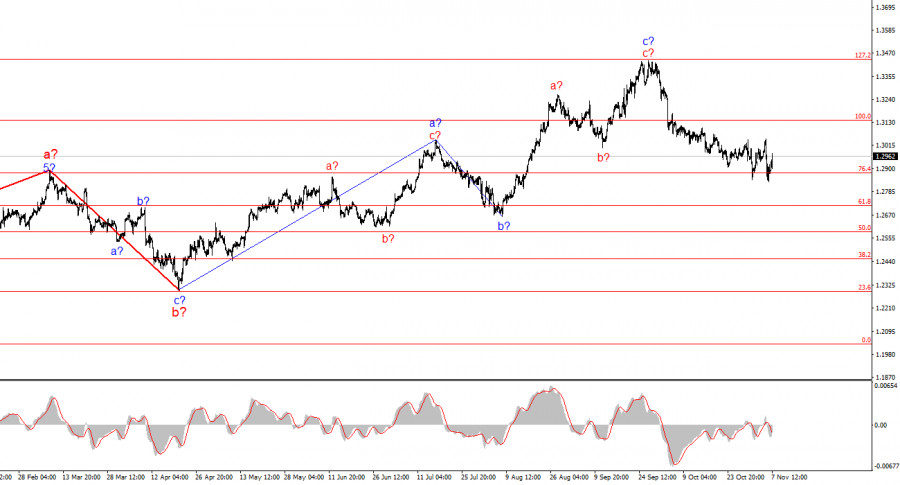
The wave structure of GBP/USD remains complex and continues to evolve into a more extended pattern. At present, there is a strong likelihood that a downward trend is beginning, as the successful breakout of wave b's low within wave c indicates the market's readiness to form not merely an individual wave but a sustained trend.
Since April 22, a series of a-b-c waves has been observed, with smaller a-b-c waves nested within them. Considering the wave structure of EUR/USD, which suggests the formation of a downward wave set, the current conditions present a favorable opportunity to initiate a new trend. If this assumption holds true, the first wave of this trend is currently in development.
The pound continues to be influenced by the Bank of England, which has been hesitant to reduce rates. However, the monetary policies of the Bank of England and the Federal Reserve in the coming months may not favor a weaker U.S. dollar. The market has long anticipated a rate reduction by the Federal Reserve, pushing the dollar to its lowest levels. At this stage, I anticipate a strengthening of the U.S. dollar.
The Pound Responds Positively to the "Basic" Rate Reduction
The GBP/USD pair rose by 90 basis points on Thursday, which seems rather peculiar. However, this week has already seen a series of unusual market movements. These movements began last Friday when demand for the U.S. dollar surged despite a disappointing Nonfarm Payrolls report. On Monday, the market showed some signs of stabilization. By Wednesday, however, Donald Trump's victory in the U.S. presidential election triggered a dollar rally. For the remainder of Wednesday and throughout Thursday, the market appeared to stabilize the U.S. dollar's exchange rate.
There are no clear reasons for the immediate strengthening of the dollar following Trump's victory, nor are there compelling explanations for the pound gaining strength amid the Bank of England's monetary easing measures. Since last Friday, market movements have aligned with the ongoing wave structure but show a weak correlation with the current news context.
Earlier today, it was announced that the Bank of England has implemented a second round of easing and is prepared to continue cutting rates if the downward inflation trajectory persists. At the same time, Andrew Bailey projected that inflation might accelerate by the end of the year, as earlier declines in oil prices likely contributed to slower price growth. However, the Bank of England remains focused on the overall inflation trajectory. If inflation continues to decline, monetary easing will proceed without pause. In my opinion, the market could develop a more robust corrective structure before initiating a new impulsive wave.

General Conclusions
The wave structure of GBP/USD remains intricate. The current structure suggests that the trend segment from April 22 may have taken the form of an a-b-c wave pattern, which would indicate its completion. From the 1.3440 level, corresponding to 127.2% on the Fibonacci scale, traders could have begun opening short positions gradually. At this point, it may be prudent to wait for a corrective upward wave before attempting to sell the pair again. Nevertheless, the decline may persist for an extended duration within the first wave, which is almost certainly impulsive. Yesterday, I highlighted 1.2800 as a potential target, and prices have already reached 1.2832.
On a larger wave scale, the wave structure has transformed. It now appears that a complex and extended upward corrective structure is forming. At present, this structure resembles a three-wave pattern, but it may evolve into a five-wave formation, which could take several months or longer to fully develop.
Key Principles of My Analysis:
- Wave structures should be straightforward and easy to interpret. Complex structures are challenging to trade and are often prone to revisions.
- If there is uncertainty about the market direction, it is better to stay out.
- Absolute certainty in market movement is impossible. Always use protective Stop Loss orders.
- Wave analysis can be effectively combined with other analytical methods and trading strategies.
from Forex analysis review https://ift.tt/sH2axuc
via IFTTT
